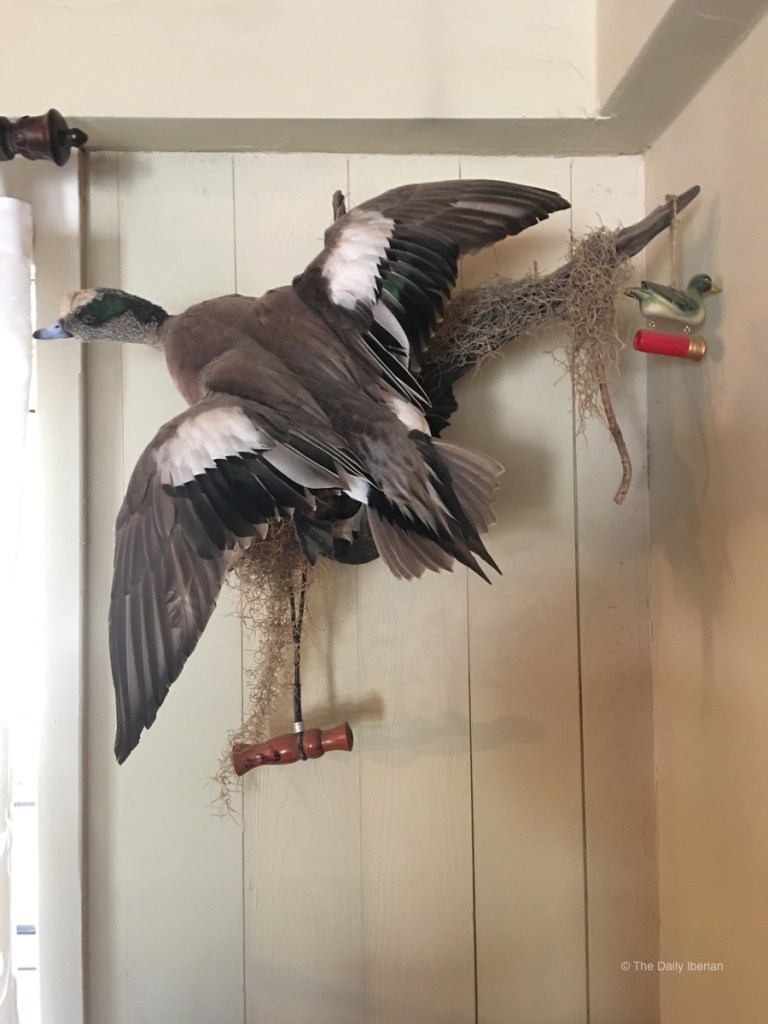Bringing ’em down late in the season
Published 6:15 am Sunday, January 7, 2018

- Kim Fouquier Jr. is proud of the ‘first duck’ he killed on Jan. 1, 2010. His buddies talked him into mounting the wigeon and he’s glad he did.
As the number of days in the 2017-18 duck hunting season dwindle, many duck hunters rely on late-season tactics to increase the harvest each time out.
Trending
Ducks here now in the Sportsman’s Paradise have been decoyed, called to and shot at from Canada to the southernmost part of the Mississippi Flyway. When they reach the end south central Louisiana, duck hunting pressure continues to influence them, savvy waterfowlers know.
With two weeks of duck hunting left in the Coastal Zone and in the West Zone, Kim Fouquier Jr. is hopeful his approach succeeds in getting more ducks in the bag down the stretch. The New Iberia waterfowler who has hunted ducks seven years — a blink of an eye compared to the years in a duck blind for many veteran duck hunters in the Teche Area — has accumulated a wealth of knowledge nonetheless.
“I like light calling, not aggressive, and small spreads of decoys. Guys I’ve been hunting with are laying down big spreads (of decoys). I don’t agree with that. They’ve (the ducks) had their butts burned off,” Fouquier said at midday Friday, soon after taking the family’s white Labrador retriever, Willie, to veterinarian Dr. Roger Boughton at the Iberia Animal Clinic.
“I don’t call hard. (I’m) just giving quacks and feed calls, unless they start going away. It depends on the species,” he said. “A mallard call typically works for all big ducks. Even gray ducks react to a mallard call. Teal, you might just want to go with a teal call.”
For sure, any aggressiveness that might have been part of duck calling early in the season isn’t there now, he emphasized.
“I don’t like to call aggressively unless they’re going and away and you know they’re going away,” he said.
Trending
Mostly, he reasoned, duck hunters must adjust to the conditions, to the moment, this late in the waterfowl hunting season. Sometimes it pays off, sometimes it doesn’t.
“It’s a sport of constant dynamics and flux,” he said.
When Fouquier went Thursday morning to hunt ducks at Grand Chenier, he was unable to get to the duck blind because there was little or no water in the pond to float the boat after so many days of a hard north wind. What water was there was frozen.
Fouquier, a 42-year-old pipeline welding inspector, and his hunting buddy, David Trahan of New Iberia, tried to make the most of it. They adjusted on the fly.
“We couldn’t get to the duck blind so we sat in the marsh behind some grass. We threw out decoys and one landed on ice and turned on its side. I heard it hit and said, ‘That’s no good,’ ” he said, noting they were setting up in the predawn darkness
The duck hunters scratched that icy morning.
Three days earlier, the results were much different. There was plenty of action and some of the ducks they downed defied explanation, Fouquier said.
He went with Andre Easton of Lafayette and Clay Begnaud of New Iberia. Easton and Trahan are in on the lease.
The Fouquier-Easton-Begnaud trio wasn’t expecting what unfolded on that duck hunt in the marsh on New Year’s Day.
“Monday, we had a crazy hunt. Really, it’s mostly gray ducks the bulk of the time. We had a mixed bag. We got two mallards, a wood duck drake and a mixed bag of green-wings and blue-wings,” he said.
“It’s hard to explain (the wood duck). We’re in the middle of the marsh. You can’t explain that.”
The three duck hunters killed nine ducks. The decoy pattern was a huge spread. Go figure.
“Monday we had a good hunt. The good thing was it was windy, so it was making the birds move,” he said.
Fouquier killed what he labels his first Louisiana duck on Jan. 1, 2010. It was a “beautiful” wigeon that was shot at the Wax Lake Outlet.
“It’s on my wall,” he said, then explained.
“My friends had to convince me (to have it mounted by a taxidermist). I don’t hunt to put anything on the wall. For me, that was going in a gumbo,” he said with a chuckle.
“Those guys made the right decision,” he said as he admired the duck.
The Catholic High School graduate actually shot his first duck, a mallard, when he was 8 or 9. It was one of two ducks in a Texas pothole he drove past while rabbit hunting at a ranch the family hunted nine hours from New Iberia, before the cost of property and leases skyrocketed.
He killed the mallard with a .410-gauge shotgun he was carrying while on the rabbit hunt.
“There were two ducks on the hole. We just happened to come across them. It was kind of cheap,” he said.
Now he hunts with a Winchester SX3 semi-automatic shotgun.
And he uses one of two duck calls given to him by his father, Kim Fouquier Sr. of New Iberia.
“My dad bought me a super mellow call. That’s old school,” he said, noting he blows the Sure Shot Triple Reed duck in the marsh.
“It sounds like the 40-year-old Yentzen he blows, and looks the same,” he said
His dad also gave him a Metz Call, made with rosewood, which he uses in rice fields. It’s a “super loud call” that echoes, he said.
When he’s in a duck blind, he does the duck calling, unless he’s with Easton.
“He’s an experienced caller. I give up the reins to him,” Fouquier said.
His job takes him out of state frequently so his duck hunting trips have been limited, he said, adding that he has been three times in the last two weeks after getting in a month ago.
For sure, he loves duck hunting as much as he does playing his guitar, which is his passion, mostly strumming the music of the late Chris Cornell, the lead singer of Soundgarden and later the band Audioslave.
Nanci Trahan Fouquier, his wife, also loves to duck hunt and goes any chance she gets, he said.
What’s in store for duck hunting before it closes Jan. 21?
“It’s touch and go out there. You’ve got to get on the front end of the fronts, which is the redundancy of redundancies. We’ll get ’em sooner or later,” he said, confidently.




